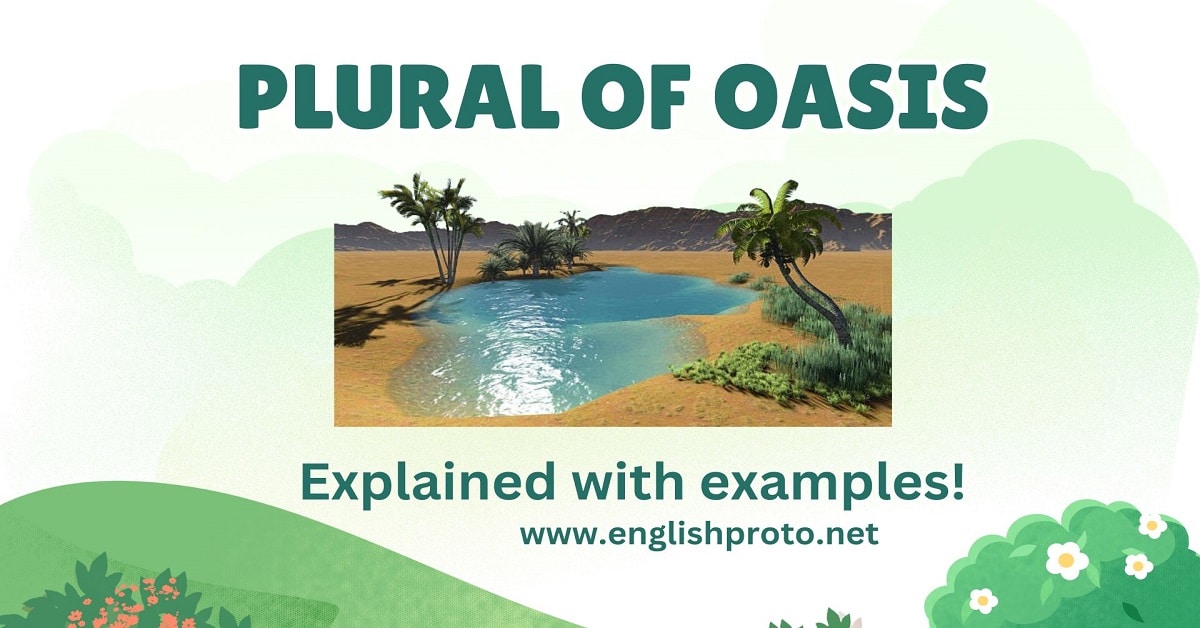The plural of oasis might sound like a tricky puzzle, but you’re about to crack it with ease. If you’ve ever found yourself hesitating between “oases” and “oasises,” or even wondered why it feels so confusing, you’re not alone.
Understanding the correct plural form isn’t just about grammar, it’s about writing with confidence and clarity that makes your words stand out.
Think about it: wouldn’t you love to master those little language details that elevate your communication? Whether you
are writing a school essay, a travel blog, or just want to sound polished in conversation, knowing the plural of oasis will give your language skills a refreshing boost. Ready to dive in and discover how to get it right? Let’s make it effortless and fun!
The Quick Summary
The correct plural form of oasis is oases. This irregular plural follows a common pattern for words of Greek or Latin origin that end in -is. Here’s a concise breakdown:
- Singular: Oasis
- Plural: Oases
Oasis refers to a fertile area in a desert where water is found, offering a refreshing refuge amidst arid surroundings. In its plural form, oases indicates multiple such areas.
⚡ Quick Tip: When changing -is nouns to their plural forms, replace -is with -es (e.g., crisis → crises, analysis → analyses).
Key Takeaways:
- The plural of oasis is oases, not oasises or oasi.
- This irregular plural form stems from its Greek etymology.
- Mastery of such forms improves clarity and professionalism in writing.
Why the Confusion?
Many English learners and even native speakers struggle with the plural of oasis due to a few key reasons:
- Irregular Plural Rules:
English has plenty of irregular plurals that defy the simple -s or -es rule. Words like cactus (plural: cacti) or crisis (plural: crises) often trip people up because they don’t follow the expected patterns. Oasis → oases is no exception. - Mispronunciation:
The plural oases is pronounced /oʊˈeɪ.siːz/, which may sound unfamiliar or counterintuitive to English speakers accustomed to -s/-es endings (like dogs or foxes). - Influence of Similar Words:
Words like basis (plural: bases) and analysis (plural: analyses) may not immediately seem related, but their shared Greek roots mean they follow similar rules. This linguistic connection isn’t always obvious, leading to errors. - Overgeneralization:
Some people mistakenly add a regular plural ending, forming oasises, which feels more “natural” in English but is incorrect. - Lack of Familiarity:
Since oasis is a relatively specific term, many people don’t frequently encounter its plural form. This lack of exposure makes the correct form harder to remember.
A Detailed Explanation
Let’s break this down for clarity.
What Does “Oasis” Mean?
An oasis refers to a lush, fertile area within an otherwise dry and barren desert, usually sustained by a natural water source. The word is often used both literally and metaphorically:
- Literal: Describing a physical location with water and vegetation in a desert.
- Metaphorical: Referring to a place or moment of peace, comfort, or relief in challenging circumstances.
Why “Oases” and Not “Oasises”?
The word oasis has Greek roots and was adopted into English through Latin. In Greek, words ending in -is typically form their plural by replacing -is with -es. This rule carried over into English, giving us plural forms like:
- Crisis → Crises
- Thesis → Theses
- Oasis → Oases
Although this might seem unusual, it’s a consistent rule for many words with similar origins.
⚡ Quick Tip: If a singular noun ends in -is, check its origin. If it’s Greek or Latin, its plural likely ends in -es!
How to Use “Oases” in Writing
When writing about multiple oases, ensure subject-verb agreement and proper article usage. For example:
- Singular: The oasis in the Sahara is a welcome sight for travelers.
- Plural: The oases in the Sahara provide much-needed relief to nomads.
Notice how the verb changes based on the subject’s number.
Common Errors and How to Avoid Them
Here are some incorrect variations and why they should be avoided:
- Oasises:
This form mistakenly applies regular pluralization rules to an irregular noun. While logical in appearance, it’s incorrect.Incorrect: The desert is dotted with many oasises.
Correct: The desert is dotted with many oases. - Oasi:
People might confuse oasis with nouns like cactus, assuming the plural adds -i. However, this pattern applies only to certain Latin-derived words.Incorrect: There are several oasi in the desert.
Correct: There are several oases in the desert. - Mispronunciation of Oases:
Pronouncing oases as /oʊˈeɪ.zɪz/ instead of the correct /oʊˈeɪ.siːz/ can confuse listeners and suggest a lack of familiarity.
Synonyms or Alternatives
If you want to vary your language or avoid confusion, here are some alternatives for oasis in different contexts:
| Context | Synonyms |
|---|---|
| Literal | Waterhole, spring, well |
| Metaphorical | Refuge, sanctuary, haven, retreat, comfort zone |
⚡ Quick Tip: Choose synonyms based on the context. For example, use spring for a natural source of water and sanctuary for a place of peace.
Examples in Sentences
To solidify understanding, here are examples showcasing both singular and plural forms:
- Singular Usage:
- The caravan stopped at an oasis to refill their water supplies.
- Her smile was like an oasis in the midst of a stressful day.
- Plural Usage:
- Several oases along the trade route provided rest for weary travelers.
- The book described the various oases scattered across the Arabian Peninsula.
Origins and History
The word oasis originates from the Greek word ὄασις (oasis), which referred to a fertile area in a desert. The term was later adopted into Latin and then passed into English, retaining its original meaning.
Its plural form, oases, follows the Greek practice of replacing -is with -es, a pattern that remains consistent across many Greek-derived words.
This etymology highlights the influence of ancient languages on English, enriching its vocabulary and adding complexity to its grammar.
Conclusion
Understanding the correct plural of oasis–oases-is a small but significant step toward mastering the intricacies of English grammar.
While it may seem like a minor detail, using the proper form demonstrates attention to detail and linguistic precision, qualities highly valued in both professional and academic settings.
To recap:
- Singular: Oasis
- Plural: Oases
- The irregular plural reflects the word’s Greek origins, following the -is → -es rule.
By familiarizing yourself with such patterns and practicing their usage, you can communicate with greater clarity and confidence. So, the next time you write about those life-saving desert havens, you’ll know exactly what to call them- oases!



